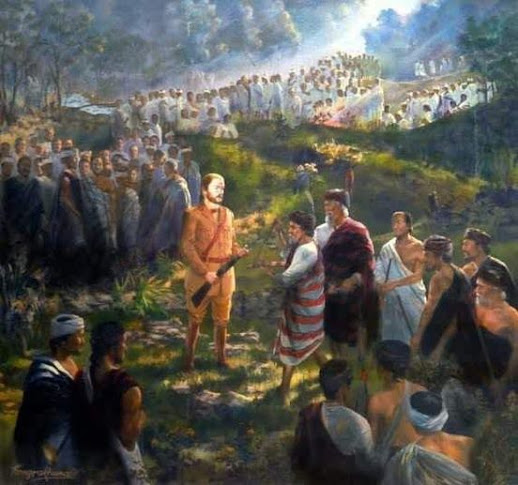The tragic story of Any-Lushai and how it is being misunderstood
- Ruata Lungchuang
Many people among the Zo community both in Mizoram and beyond are familiar with the term Lushai. Thanks to insufficient research and manipulation of historic facts on social media, a term like Any-Lushai has become a topic of controversy especially among Zo people outside of Mizoram so much to a point that some people have become almost hostile towards the name itself. In actuality, Lushai by itself is nothing controversial but rather a very misunderstood nomenclature that comes to haunts Zo people now and again as it is something very important and an integral part of our heritage yet very controversial because of the reasons mentioned above. Some even see it as a force that prevents unification.
Truth be told, there is nothing controversial about the term Lushai nor is it a conspiracy brewed by the Luseis to trick others into becoming Luseis.
By the late 1800s in what was later to be called Lushai hills, Kuki was not a popular term and have never been a popular term to denote the people living there in particular. Since most of its inhabitants were already Duhlian speaking, the British lump them together as Lushai irrespective of tribes. The people themselves never called themselves Lushai but Mizo. Lushai was an umbrella term to denote various Zo tribes including the Luseis. Since Lushai is a corrupted word derived from the already existing Lusei, It was later then changed to a name that the locals have employed to call themselves - Mizo. Hence, Any-Lushai or Any-Zo people become Mizo. Just like Any-Kuki, Any-Naga, Any-Lushai simply denotes any person belonging to any tribe that makes up the Lushai people which was a conglomeration of various Zo tribes, not exclusive to Lusei tribe and its clans.
The terms Lushai and Lusei are not the same. While Lushai denotes the larger Mizo population including the Luseis, Lusei specifically refers to the Luseis, a Mizo tribe. So in all technicality, every Zo person is entitled to call himself a Mizo or be a part of what was called "Any Lushai". We have this habit of considering the invader Saps who divided us into various nomenclature as our fellow Zo people who understand our people and yearns for Zo unity, often citing things like Any-Lushai as an argument to spite well-wishers. The Britishers were not at all concerned about our unity or our politics in NE, they just lumped us into what they find convenient. So Lushai nomenclature wasn't some kind of evil ploy by the Luseis but a colonial term constructed by the Sap themselves. We need to look at things in this light.
Some of the few Sap( White man) who were interested in our people and our way of living like Colonel J Shakespeare was kind enough to write about the people of Lushai hills, and their writing further cement the fact that Lushai was not a tribe but a nomenclature and that even the saps( Whiteman) knew the difference between Lusei and Lushai.
Here is an excerpt from His book titled Lushei-Kuki clans written in 1912.
"The term Lushai, as we now understand it, covers a great
many clans; it is the result of incorrect transliteration of the
word Lushei, which is the name of the clan, which, under
various chiefs of the Thangur family came into prominence in
the eighteenth century and was responsible for the eruption
into Cachar of Okl Kukis at the end of that century and of the
New Kukis half a century later.
The Lusheis, however, did not eject all the clans they came
in contact with, many of them they absorbed, and these now
form the bulk of the subjects of the Thangur chief. In this
monograph Lushai is used in this wider sense, Lushei being
used only for the clan of that name. Among the people them-
selves the Lusheis are sometimes spoken of as Dulian, at the
derivation of which I will hazard no guess, and the general
population of the hills is spoken of as Mi-zo."
Note that Shakespeare acknowledges the fact that Lushai was an umbrella term and that the general population of Lushai hills calls themselves Mizo, not Lushai or Lusei. Again, there is a myth circulating on social media that Mizo is a recently invented term that comes out in the early 1940's, some will even go as far as calling it a made-up name started in the 1960s. But if one truly knows what he's talking about, he'd also be aware of the fact that the first newspaper ever published in chin-Kuki-Mizo dialect was already named "Mizo Chanchin Laisuih" The paper was already in circulation way back in late 1800, not to mention songs like "Mizo Kan Nih lawm ilangi'n " were already a popular hit in Lushai hills by the 1910s. These bold incorrect claims regarding the origin of Mizo arises not because of any misunderstanding or mistake done by our forefather but because of the future generations lack of knowledge about our history and believing whatever we find on the internet.
As a people group, understanding each other and our history is a must if we ever want to achieve unity. It is important that we have a clear mind and not be swayed by what every Tom, Dick and Harry of the internet have to say about our people. Mizo youths need to calculate a feeling of intellectual independence and do their own research on subjects relating to Mizo polity and not be completely dependent on what a group of "Mizo Intellectuals" Mainly composed of Mizo men have to say. In today's world of the digital age, archived documents and writings can be easily procured if one really has the desire to access them.

